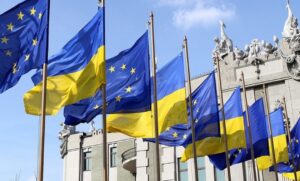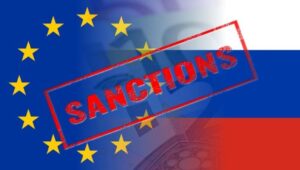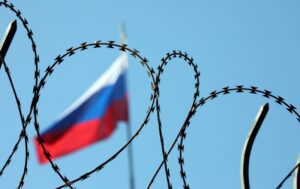
The agreement between Ukraine and the EU on the liberalization of cargo transportation has been prolonged until 30 June 2024. The document, signed in June 2022, removes the need for Ukrainian carriers to obtain permits for bilateral and transit traffic to EU countries.
According to Deputy Prime Minister – the head of the Ministry of Transport Oleksandr Kubrakov in Facebook, the relevant agreement was reached at the first meeting of the joint committee of the Agreement on freight transport by road.
“During the first year the agreement has proved its practical effectiveness. For the period of its validity, the volume of bilateral and transit road freight traffic has increased by more than 50%,” he noted.
After the agreement was signed on June 29, 2022, the number of carriers crossing the border toward the EU increased by 53% compared to the same period in 2021, and the number of crossings itself increased by 43%.
The Deputy Prime Minister noted the potential for further growth, in particular through the joint development with European partners of the necessary logistical infrastructure at the border. He reminded that since the beginning of the full-scale invasion, two new checkpoints have been opened on the Romanian border, as well as a control point on the temporary infrastructure for empty trucks at the border with Poland. In addition, the capacity of the Krakivets-Korcheva checkpoint was expanded and the operation of the Jagodin-Dorogusk checkpoint on the border with Poland was streamlined.
“The effective implementation of the “transport visa-free” brings us closer to our main foreign policy goal – gaining EU membership,” Kubrakov stressed.
Deputy Prime Minister reminded that the agreement also simplifies the procedure of recognition of driving documents: Ukraine and the EU have exempted holders of driving licenses issued by one of the parties from the requirement to have an international driving license.

The European Parliament adopted updated EU regulations on the allocation of efforts to reduce the maximum allowable level of greenhouse gas emissions in member states at a plenary session in Strasbourg on Tuesday.
The bill was approved by 486 votes, with 132 against and 10 abstentions.
The said novelty establishes mandatory annual greenhouse gas emission reductions for motor vehicles, building heating, agriculture, small industrial plants and waste management for each EU member state.
“The revised law increases the 2030 greenhouse gas emission reduction target at the EU level from 30 percent to 40 percent from 2005 levels. For the first time, all EU countries must now reduce greenhouse gas emissions with targets ranging from 10% to 50%,” according to the European Parliament’s communiqué on the vote.
The document explains that the 2030 targets for each member state are based on GDP per capita and economic efficiency indicators. EU countries will have to ensure that they do not exceed their annual quotas on greenhouse gas emissions every year.
In addition, the updated regulation includes “limits on the ability to trade, borrow and save emissions.”
“There are limits on how much emissions member states can save in previous years, borrow from future years, and how much they can trade allowances with other member states,” the European Parliament explained.
The text of the new law must now be formally approved by the EU Council, after which it will be published in the Official Journal of the European Union and enter into force in 20 days.

The European Union (EU) is extending trade protection measures for Ukrainian exports to the EU, known as autonomous trade measures, for another year.
“In solidarity with Ukraine, we have proposed extending the suspension of import duties, quotas and trade protection measures on Ukrainian exports to the EU for another year. And we are working to deepen Ukraine’s integration into the EU single market,” European Commission Vice President Valdis Dombrovskis said Tuesday at the end of a meeting of the EU Economic and Financial Ministers Council (Ecofin).
There are also plans to send Kiev a second tranche of emergency financial aid at the end of March.
“As for the EU emergency financial support for Ukraine, the second disbursement under the macrofinancial aid plus instrument, 1.5 billion euros, should be made at the end of this month,” Dombrovskis said, adding that the total financial support for Ukraine’s budget in the first quarter of this year will result in a total of 4.5 billion euros.
According to him, at the Ecofin meeting he briefed on the status of implementation in Ukraine of reforms necessary to pay the second tranche. The EC is “at the final stage of assessing the conditions for making a decision,” Dombrovskis specified.
In April 2022, the European Commission proposed that import duties on all Ukrainian exports to the EU be suspended for one year.
Last December, the EU Council approved a decision on macrofinancial assistance to Ukraine for the year 2023 in the amount of EUR 18 billion, the loan is provided with a 10-year grace period. In January, Kiev received the first tranche of €3bn. Subsequent payments will be made on a monthly basis starting from March at 1.5bn euros.
The EC believes that with these funds Ukraine will be able to continue paying salaries, pensions, support the functioning of key public institutions, including hospitals, schools and housing for displaced people. In addition, the EU assistance should allow the country to rebuild its infrastructure and maintain macroeconomic stability.

Trade between the European Union and Russia has fallen significantly since Russia’s invasion of Ukraine, especially noticeably in recent months, the EU statistics office (Eurostat) reported Friday.
Russia’s share of EU imports fell to 4.3 percent from 9.5 percent between February and December 2022, according to the statistical data. During the same period, Russia’s share of EU exports fell to 2 percent from 4 percent.
The EU’s trade deficit with Russia peaked at €18.2 billion in March 2022 and then gradually declined to €6.0 billion in December 2022. The value of imports from Russia during this period fell 53% to €10.3 billion from €21.8 billion.
Eurostat notes that “as Russia gradually replaced other trading partners, its share of EU imports fell across six key commodities. Among them, the largest drop was recorded for coal (to 22% in 2022 from 45% a year earlier), natural gas (to 21% from 36%), fertilizers (to 22% from 29%), iron and steel (to 10% from 16%).

The adoption by the European Union of new carbon dioxide standards for cars and buses is postponed to a later date due to opposition from Germany, some other countries and the center-right wing of European lawmakers, the representative office of Sweden, which holds the EU Council presidency, said.
“The vote (originally scheduled for next week – IF) will take place at a later (EU) Council meeting,” the Swedish presidency said Friday, noting that no date has yet been set.
Last year, EU lawmakers and member state governments agreed that manufacturers must cut emissions from new cars by 55 percent by 2030 from 2021 levels and 100 percent in 2035. In effect, this means that sales of new cars that run on hydrocarbon fuels, such as petroleum products, will be banned.
Some countries, including Germany, have asked the European Commission (EC) to make an exception for cars running on “green fuel. It can be made from renewable energy sources and carbon emitted from the air. However, the EC is still silent.
The center-right European People’s Party (EPP), the largest faction in the European Parliament, opposes the ban and calls on the governments of the Union to do so.
The EPP’s chief negotiator on the issue, Jens Gieseke, motivated the conservatives’ position by the fact that the ban would hinder innovation, lead to the loss of thousands of jobs and the decline of a crucial European industry.
“The world will continue to drive cars with internal combustion engines. Our job is to make them as CO2-efficient as possible, not to ban them. Green fuels can help,” Gieseke said.
The European Greens are of a different opinion. Their leader in the European Parliament, Philippe Lambert, believes that this should not be a topic for further debate. Germany has already agreed to phase out internal combustion engines, and Brussels has already decided on this. Germany must remain a reliable European partner, he said in a statement sent to journalists.

The European Union on Saturday, February 25, enacted the tenth package of sanctions against Russia, the EU press service said.
“The Council decided to introduce restrictive measures against 87 more individuals and 34 legal entities,” the text of the communiqué reads.
The list of restrictive measures includes Russian officials, military leaders, propagandists and, among others, the former general director of Motor Sich, Vyacheslav Boguslayev. He is on trial in Ukraine for treason.
In particular, the sanctions will affect such organizations as Alfa Bank, Rosbank and Tinkoff Bank, Commercial Automobiles – GAZ Group LLC, a number of Rosatom companies, Patriot media group, National Reinsurance Company, and Yevgeny Primakov, head of Rossotrudnichestvo, Russian Human Rights Commissioner Tatyana Moskalkova, Deputy Head of Moscow Region Government Vyacheslav Dukhin for deportation of Ukrainian children to Russia, surgeon Leonid Roshal, head of Russian Presidential Council for Civil Society and Human Rights Valery Fadeev, Rosatomflot enterprise, which operates the Russian nuclear icebreaker fleet, the Russian Defense Ministry, the Russian Foreign Intelligence Service, Kirill Kleimenov, Deputy General Director of Channel One, Alexander Akopov, Deputy General Director of National Media Group, and military commander Alexei Avdeev, Mikhail Teplinsky, military commander, Sergei Karakaev, Rossiya Segodnya media group and executive director Kirill Vyshinsky, Rossiya 24 chief executive Yevgeny Bekasov, Literaturnaya Gazeta chief executive Maxim Zamshev, Regnum agency chief Marina Akhmedova, and Sputnik news agency.
The sanctions also affected four Iranian citizens, including the managing director of the aerospace company Qods Aviation Industry.
The sanctions include an asset freeze, a ban on entry and transit through EU countries and a ban on citizens and companies in the EU providing funds to them.
“We will continue to increase the pressure on Russia for as long as necessary,” said Josep Borrell, head of EU diplomacy.
Source